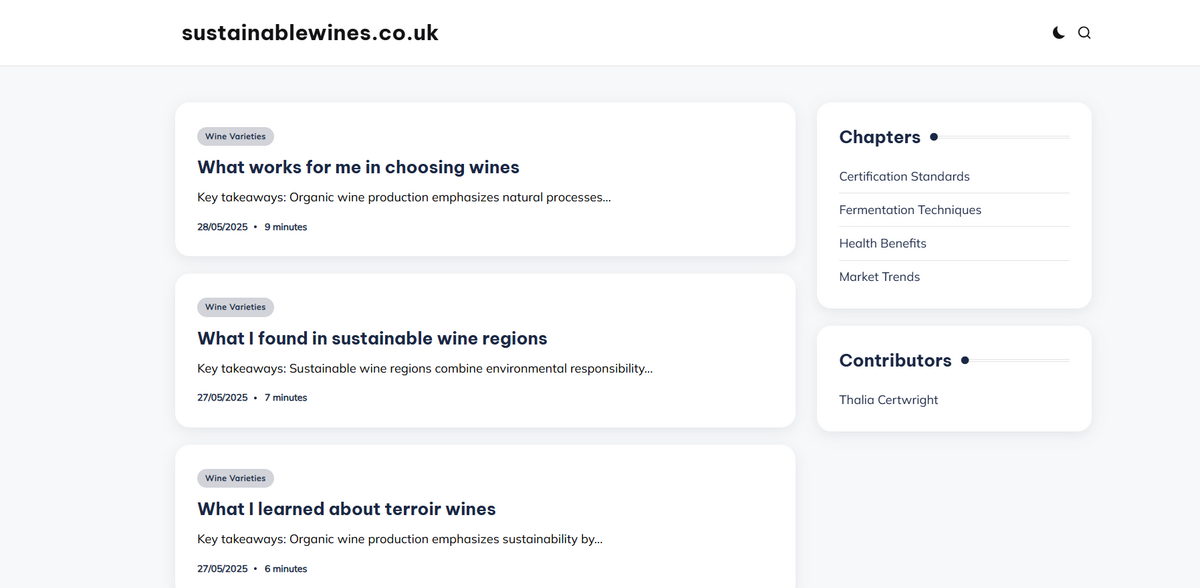Organic Wine Production: A Journey into Natural Authenticity
Organic wine production emphasizes natural processes and sustainability, enhancing both flavor and ecological responsibility. It is a fascinating journey that relies on genuine expressions of the land, where winemakers avoid synthetic chemicals. In organic vineyards, techniques like cover cropping and composting are utilized to foster soil health and biodiversity. This approach isn’t just a passing trend; it reflects a deep commitment to sustainable practices that benefit the environment. Every bottle tells a story of nature’s bounty, where the natural environment is allowed to shine through, expressing its true personality through vibrant aromas and a depth of flavor that occasionally surprises and delights.
Main Benefit: Enhancing Flavor & Ecological Responsibility
- Organic wine production centers on using organic grapes, grown without synthetic fertilizers or harmful chemicals.
- The absence of synthetic pesticides and herbicides makes the wine production process both clean and environmentally friendly.
- Sustainable practices like cover cropping and composting improve soil health and promote biodiversity.
- Certification labels provide assurance of genuine organic methods and a commitment to environmental responsibility.
Embracing the Natural Connection
Organic wine production serves as a true reflection of nature’s power and beauty… Natural processes, rather than synthetic options, guide the fermentation and growth of these wines. In the heart of a thriving vineyard, each vine contributes to a dynamic ecosystem where soil health and biodiversity come first. The commitment to sustainability is evident in every step of the process. As winemakers focus on natural techniques, each sip becomes a window into nature’s own artistry. The vibrant aromas, the depth of flavor—it all feels like a genuine expression of the land. This approach is not only about creating a beverage, but about capturing the soul of nature and sharing it in every bottle.
Exploring Lesser-Known Varieties
For those seeking something a bit different, organic wine production offers endless opportunities to explore. It is often recommended to venture beyond the mainstream offerings and try lesser-known varieties and regions. The tasting notes and personal descriptions provided by winemakers can offer fascinating insights into their philosophy and passion. These narratives provide a peek behind the curtain into how each wine is crafted with authentic care. They reveal the subtle influences of climate, soil, and time-working methods, all converging into a unique product that is as much about tradition as it is about innovation. Casual evenings spent discovering these hidden gems often lead to memorable experiences and a newfound appreciation for the diverse world of wine.
Wines That Resonate with Personal Memories
The appeal of organic wines is not limited to their sustainable production methods. They also have the power to evoke memories and connect with personal experiences in a way few other drinks can. Often, a particular vintage or bottle will resonate with cherished moments, making each taste a nostalgic journey. This connection to past experiences provides an additional layer of enjoyment—transforming a simple glass of wine into a meaningful ritual. Such wines have the inherent ability to recall warm memories and instill a sense of belonging, all while championing environmentally responsible practices.
Impact on Sustainability and Biodiversity
- SDG 12 – Responsible Consumption and Production: Emphasizing the use of organic processes ensures a responsible and sustainable approach to wine production.
- SDG 13 – Climate Action: Sustainable vineyard practices contribute to climate resilience by preserving soil health and reducing chemical usage.
- SDG 15 – Life on Land: Promoting biodiversity and natural farming practices strengthens local ecosystems, protecting flora and fauna alike.
Brands Embracing Organic Integrity
Several brands have made a name for themselves by wholeheartedly embracing organic viticulture. A prime example is Frey Vineyards, renowned for its commitment to organic farming and biodynamic practices. Their wines are crafted with a sensitivity to the land that brings out natural flavors and vibrant character. Coturri Winery also stands out as a pioneer in this field, delivering products that are as ethically produced as they are delightful to the palate. Then there is Organic Wine Works, a brand that masterfully crafts approachable and delicious organic wines. These names demonstrate that organic wine production is not only about environmentally responsible practices; it is also about creating a product that resonates with genuine passion and history. Enthusiasts of organic wines are drawn to these brands because they offer both authenticity and an experience that transcends the typical drink. Continuous exploration of such wines reveals not only the beauty of nature but also the human commitment to preserving that beauty for future generations.


















